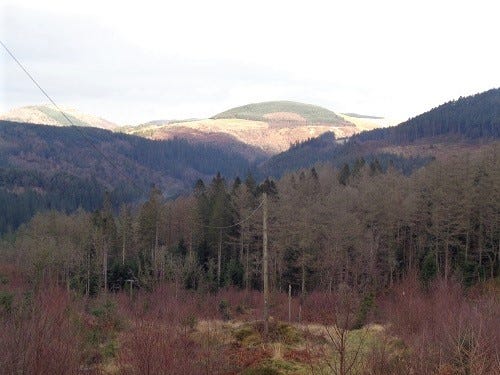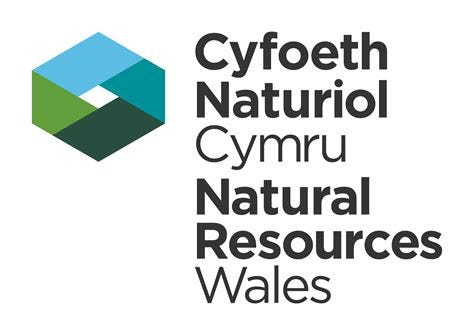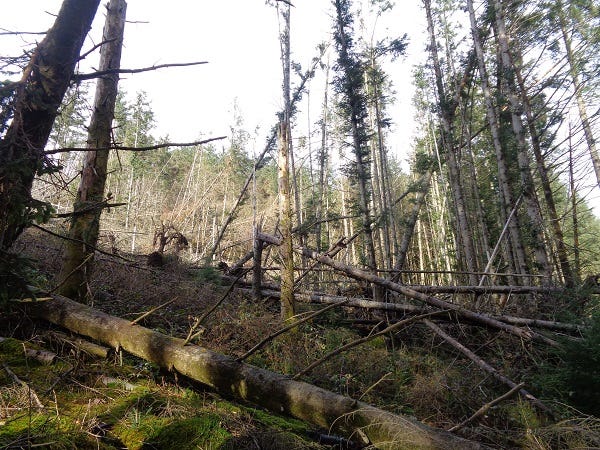Cyfoeth Naturiol Cymru - Natural Resources Wales.
Confusion and Carbon Budgets.
In the story of The Real Coed Y Brenin, its time to talk about Cyfoeth Naturiol Cymru or Natural Resources Wales1 (NRW), the environmental body in Cymru with a huge remit a shrinking budget and workforce, attracting increasing criticism. So what has happened here?
above: pretty view of the forest over dead larch (phytophthora ramorum).
NRW was formed on 1st April 2013 (the date itself is a bit ominous!) by amalgamating the Countryside Council for Wales (CCW), the Forestry Commission Wales (FCW) and the Environment Agency Wales (EAW). On paper this has some logical sense in terms of cost savings. For example, all three bodies had their own marketing, accounting, translation and human resources departments. By unifying these and other departments in a single organisation, considerable savings could be made.
So what happened? First, a quick look at the responsibilities of those three separate bodies.
The Environment Agency Wales.
Responsibilities included reducing industry's impacts on the environment, enforcing pollution legislation and reducing the harm caused by flooding and pollution incidents. It also oversaw the management of waste, water resources and freshwater fisheries, cleaning up rivers, coastal waters and contaminated land and improving wildlife habitats.
By influencing others to change attitudes and behaviour, it aimed to make the environment cleaner and healthier for people and wildlife. That's a pretty broad remit to begin with.
The Countryside Council for Wales.
Responsible for wildlife conservation, landscape and countryside access in Wales. the Countryside Council for Wales claimed to have 'championed the environment and landscapes of Wales and its coastal waters as sources of natural and cultural riches, as a foundation for economic and social activity, and as a place for leisure and learning opportunities'. Its aim was to 'make the environment a valued part of everyone's life in Wales'. Plenty to do then.
Forestry Commission Wales.
Responsible for the management of publicly owned forests and the regulation of both public and private forestry in Wales, also tasked with promoting forestry and the production of timber for trade and conducting research. The decline in timber sales since the mid-1990s forced the Commission to focus on research and recreation more than ever before, something that was encouraged by the government and initially supported by European funding.
Before I go on to the amalgamation of these three bodies to create NRW, its worth making a mention of the problems inherent in large organisations that are divided into departments. Basically, an organisation or body such as those above, receives some form of funding, in these cases from central government (originally London, more latterly the Welsh Government) and in some case additional funding for specific areas of work, such as from Europe (until Brexit cut off that source).
That funding is then divided between the various departments, each department then having it's own budget. Its easy to see how this can create competition between departments as they all attempt to grow themselves, their budgets and workforce. This is true of any organisation such as national governments or the Permaculture Association Britain. How this sharing out occurs, whether it is an amiable, collaborative process based on practicalities and shared priorities or rather a cloak and daggers, clique ridden back stabbing coup, will depend upon the ethics and morality of the organisation and its individual members. As an example, a friend who worked for CCW described how individuals in the organisation would seek to steer funding towards their favourite plants or animals (such as a dormouse).
Natural resources Wales: 1st April 2013
Interestingly, the first board appointed by Environment minister John Griffiths did not include any representatives from the forestry sector, and concerns were raised at the time that the forestry industry's voice would not be adequately heard in the new organisation. This was reflected in the chaos of the first three years as individuals and groups from the three separate organisations jostled for limited roles and budgets within the new body.
Firstly, there seemed to be a complete lack of understanding of how complicated and drawn out such an amalgamation would be. The whole process of uniting the very different organisations, producing new contracts, transferring staff, making redundancies, designing and producing new logos (obviously crucial to the whole process...) and signage (for more on the grand signage redesign, see here) etc. etc. took some three years and was fraught with difficulties, challenges, inertia and bad feeling.
Within each of the three august bodies, you had individuals and teams that had built up over many years, had fought hard to maintain or increase their budgets and grow their organisations. Now they were being asked (told) to make decisions on what and who would be transferred to the new body.
On the ground here in Coed Y Brenin, the result was that nothing was done. Further contraction of the forestry workforce meant more work going to private contractors who had no links to the local community, resulting in increasing problems during and following forest operations like clear felling (debris on roads, blocked drains and culverts etc.). My local community council had great difficulty finding out who was responsible for what due to staff turnover and changes in roles. Foresters, for example, became more ominous sounding Operations Managers. We invited one to our meetings on various occasions to give us the low down and they were visibly and vocally depressed about the chaos of the amalgamation- I ended up feeling sorry for them...
So NRW took on the responsibilities of the three organisations and also assumed other roles formerly performed by the Welsh Government. I would need several newsletters to provide a complete list (see NRW's website for more details) but the following, summarised from Wikipedia, will give you an idea.
Adviser: principal adviser to Welsh Government, and adviser to industry and the wider public and voluntary sector, and communicator about issues relating to the environment and its natural resources.
Regulator of the marine, forest and waste industries.
Designator for Sites of Special Scientific Interest, Areas of Outstanding Natural Beauty and National Parks, as well as declaring National Nature Reserves, and describing Marine Character Areas.
Responder to environmental incidents.
Statutory consultee to about 7,000 development planning applications a year.
Manager/Operator: managing seven per cent of Wales’ land area including woodlands, National Nature Reserves, water and flood defences, and operating visitor centres, recreation facilities, hatcheries and a laboratory.
Partner, Educator and Enabler: collaborator with the public, private and voluntary sectors.
Evidence gatherer: monitoring the environment.
Employer of almost 1,900 staff with a budget of £180 million.
If we take just one of those areas above, the regulatory responsibilities and look in a little more detail, you'll get an idea of how huge the remit is. NRW is responsible for more than 40 different types of regulatory regime, for example:
major industry (refineries, chemicals, cement, power stations, iron and steel, food and drink etc.).
waste industry (storage, treatment, disposal).
Sites of Special Scientific Interest - consents and assents.
radioactive substances (nuclear and non-nuclear).
European protected species licensing.
marine licensing.
tree felling licensing.
water discharges (surface and groundwater).
water resources (abstraction, impoundment, drought).
packaging regulations and EU/UK trading schemes.
commercial fisheries (eels, salmon, shellfish).
Countryside and Rights of Way Act 2000 – access restrictions, open access land.
You get the idea, NRW's remit is indeed massive, broad and extremely fine detailed.
An obvious problem here is that while one arm is a manager and operator, actively involved in physical stuff in the environment, such as forest operations or flood defences, yet another arm of the same organisation is the regulator, that is to say, NRW has to regulate itself. This is evident in public notices in local papers where NRW are undertaking some operation, like altering a flood defence and they state that in this instance an environmental report is not considered necessary. At least in the days of the Environment Agency Wales there was a separate body you could go to if you felt some operation of Forestry Commission Wales was detrimental to the environment.
Clearly, NRW's responsibilities and activities are so large that I could fill multiple newsletters and still not get to the end of it. Similarly if I attempted to detail all the difficulties and problems they have faced or created. As one example I could mention the failure of their design to protect the sea defences in Fairbourne, a multi-million pound operation that made the situation worse, until several more millions were spent to put it right (or at least, right-er). Rather than go on and on, I'll end with this salutary tale.
above: a stand of spruce, planted in the mid nineteen eighties never thinned hence over-tall with limited root space and very susceptible to wind throw.
NRW and departmental carbon budgets. A good thing, surely?
Each department in the new body was set a carbon budget which they were told not to exceed. My source (we shall call them Brithyll, disguising both identity and gender), lived in the Dolgellau area and found in their new role they had to travel down to the NRW Headquarters in Cardiff most weekdays. With no north-south rail links within Cymru (blame Beecham) Brithyll drove, a road distance of approximately 129 miles. This meant that by Wednesdays, towards the end of the month, the department's carbon budget was almost used up.
So, work from home, you would think but no, Brithyll still had to go to the office. The NRW solution was to require them to rent a car as the carbon cost of a rented car was not included in the department's budget, it was externalised2 to the rental company. In order not to make this too obvious, a non-local car hire company was used, so this might be in Shrewsbury, about 56 miles away. The car would be delivered to Dolgellau by a driver and of course, a second car and driver had to accompany the first, in order to take the first driver back to Shrewsbury.
On Thursday, the department carbon budget was still under threat, of course but using the same hire car again was not possible, as that would make it "regular use" and the carbon cost would then accrue to the department. The solution? To hire another car, from a different company, perhaps from Llandudno, about 50 miles away. Repeat the delivery process, two cars, two drivers. Come Friday and yes, the department budget is still threatened so yet another car is hired from yet another company with a repeat of the delivery process.
The hire cars were generally not collected until Sunday, by which time there would be three of them sitting outside Brithyll's house. Then, three cars would turn up with two drivers in each, from the three different hire companies, collect the cars and they'd all drive off, back to their various, disparate locations. Next month, the same thing was just as likely to happen and the whole process be repeated but, hey, the NRW department always kept within their carbon budget- a success then!
Brithyll, previously employed in one of the three former bodies, described moving into NRW, as going from the best job in the world to the worst in just three years. He resigned the post, unable to bear the hypocrisy.
Thanks for reading and a warm welcome to new subscribers. Comments always welcome as are suggestions for topics, in particular here, things to do with forestry and Coed Y Brenin. Still to come in The Real Coed Y Brnein, the Minerals and Mines of Coed Y Brenin, (Thar’s Gold in them there hills!) and The Great Volcano, plus much more. Hwyl! Chris.
I have mentioned before the mismatch in the translation of the names; In the Cymraeg we have Cyfoeth, usually translated as Wealth, whereas in the English we have Resources, usually translated as Adnoddau. Various folk have pointed this out recently and used the discrepancy in different ways. So Rhys Llywelyn, chairman of Caru Coed Cymru, the community group set up recently in an attempt to save the Coed Y Brenin visitor centre which NRW are threatening to close, speaks of wealth as something to manage carefully and invest wisely, whereas resources get used and gobbled up.
above: protest at the Coed Y Brenin visitor centre, organised by Caru Coed Y Brenin. Some great signs: NRW- Not Really Working.
Externalising environmental costs is a classic method for companies to keep prices down. Fuel for air travel, for example, is not taxed to cover the cost of the environmental damage it's use creates- the cost is externalised onto the environment and ultimately we have to pay for it through our attempts to mitigate against and repair the damage caused by global warming. This is not unique to businesses- by using our local laundrette, for example, I externalise the carbon cost of my washing onto the laundrette.







